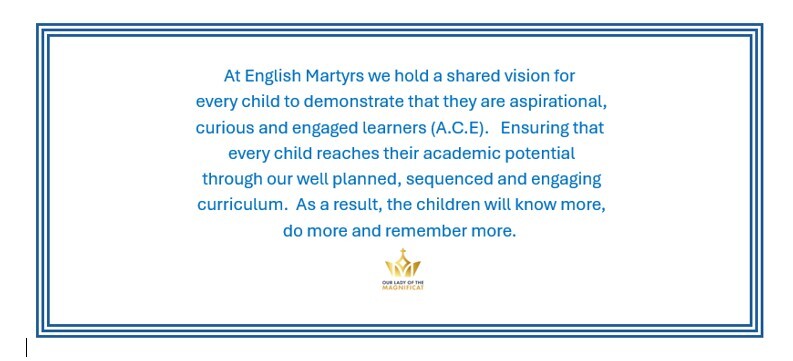- Home
- Curriculum
- Subject Information
- Music
Music

What does this look like in Music?
At English Martyrs, we believe that music inspires children to be aspirational, curious, and engaged learners. Our curriculum encourages creativity and imagination, promotes a love of music, and allows children to explore a wide range of cultures and sounds.
Curriculum Intent:
The EYFS curriculum includes rich opportunities for pupils to encounter the joy of music through singing and playing. Within the Foundation Stage, pupils can experiment with musical instruments through adult led activities and within the continuous provision. Pupils sing and perform a range of well-known nursery rhymes and songs whilst learning how to move in time with music.
Our music curriculum follows the Charanga scheme, which provides an engaging and comprehensive approach to teaching music. With Charanga, our students learn music through a variety of methods, including singing, playing instruments, and composing their own music. Our goal is to foster a lifelong love of music in our pupils and help them develop their musical skills to their full potential.
Curriculum Implementation:
The scheme is designed to support strong progression across each year group, with high expectations for what children can achieve in every unit. Each unit follows the same structure throughout the school, including listening to and appreciating music, learning songs, keeping beats and rhythms, and using both tuned and untuned instruments.
What a typical lesson looks like:
Flashback: An opportunity for pupils to retrieve and build upon previously acquired skills, through a ‘Last Lesson, Last Unit, Last Year, Challenge’ approach.
Teach it: Introduction to new learning with live modelling and explicit addressing of potential misconceptions.
Practise it: Children are given the opportunity to practise and use new skills.
Prove it: Children apply new knowledge and skills.
Dig deeper: Encourage children take skills and knowledge from other areas and apply them e.g. challenge children to compose short pieces using what they’ve learned. Asking open-ended questions (e.g. “How does this piece make you feel and why?”).
Assessment
- Lesson drop ins
- Pupil voice
- Data drops
Curriculum Impact:
Our music curriculum is inclusive, providing all pupils with access to the same rich learning experiences, regardless of individual learning needs or disabilities. We adapt, support, and challenge as needed to ensure every child can fully engage and progress in their musical journey.
Monitoring, Evaluation and Review
Pupil voice will demonstrate:
- A growing understanding of listening, appraising, singing, instrumental work, composing, and performing at an age-appropriate level.
- Clear progression in musical knowledge, supported by the use of relevant and developing vocabulary.
- Confidence in talking about music, reflecting on their own work, and identifying both strengths and areas for improvement.
Link to: